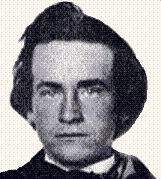 Robinson Crusoe, as we all know, took Friday as his slave. But suppose that instead of taking Friday as his slave, Robinson Crusoe had welcomed him as a man and a brother, had read him a Declaration of Independence, an Emancipation Proclamation and a Fifteenth Amendment, and informed him that he was a free and independent citizen, entitled to vote and hold office, but had at the same time had also informed him that that particular island was his (Robinson Crusoe’s) private and exclusive property. What would have been the difference? Since Friday could not fly up into the air, nor swim off through the sea, since if he lived at all he must live on the island, he would have been in one case as much a slave as in the other. Crusoe’s ownership of the island would have been equivalent to his ownership of Friday.
Robinson Crusoe, as we all know, took Friday as his slave. But suppose that instead of taking Friday as his slave, Robinson Crusoe had welcomed him as a man and a brother, had read him a Declaration of Independence, an Emancipation Proclamation and a Fifteenth Amendment, and informed him that he was a free and independent citizen, entitled to vote and hold office, but had at the same time had also informed him that that particular island was his (Robinson Crusoe’s) private and exclusive property. What would have been the difference? Since Friday could not fly up into the air, nor swim off through the sea, since if he lived at all he must live on the island, he would have been in one case as much a slave as in the other. Crusoe’s ownership of the island would have been equivalent to his ownership of Friday.
Chattel slavery is, in fact, merely the rude and primitive mode of property in man. It only grows up where population is sparse. It never, save by virtue of special circumstances, continues where the pressure of population gives land a high value, for in that case the ownership of land gives all the power that comes from the ownership of men, in more convenient form. When in the course of history, we see the conquerors making chattel slaves of the conquered, it is always where population is sparse and land of little value, or where they want to carry off their human spoil. In other cases, the conquerors merely appropriate the lands of the conquered, by which means they just as effectually, and much more conveniently, compel the conquered to work for them.
– Henry George, Social Problems, Chapter 15, “Slavery and Slavery”